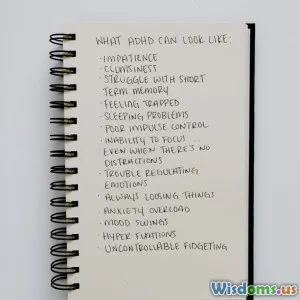
Unlocking Your Emotional Potential: A Guide
7 min read Discover how to unlock your emotional potential for healthier relationships and personal growth. (0 Reviews)
Unlocking Your Emotional Potential: A Guide
Introduction
Have you ever wondered why some people seem effortlessly in tune with their emotions, while others struggle to understand or express them? Emotional potential—the ability to perceive, manage, and harness your feelings—plays a pivotal role in personal development, mental wellness, and healthy relationships. Unlocking this potential isn't just about feeling better; it’s about enhancing your decision-making, resilience, and connection with others.
As psychologist Daniel Goleman highlighted, emotional intelligence can be twice as important as IQ in determining success and well-being. This guide uncovers how you can tap into your emotional potential by deepening emotional awareness, cultivating empathy, and developing emotional regulation skills.
The Foundations of Emotional Potential
Understanding Emotions: The First Step
Before unlocking your emotional potential, it’s essential to understand what emotions are and their functions. Emotions act as internal signals—alerting us to opportunities, threats, and needs. Harvard psychologist Dr. David Caruso defines emotional intelligence as “the ability to perceive accurately, appraise, and express emotion; the ability to access and generate feelings when they facilitate thought.”
For example: feeling anxiety before a presentation motivates preparation, while empathy enables you to support a friend in distress genuinely.
Emotional Self-Awareness
Self-awareness is the cornerstone. You must first recognize and identify your emotions to manage them effectively. Research from the University of California, Berkeley indicates that individuals with high emotional self-awareness often experience less stress and stronger interpersonal bonds.
Try this exercise: keep an emotion journal throughout your day, noting situations paired with your emotional responses. Over time, patterns emerge that illuminate triggers and habitual reactions.
Cultivating Emotional Intelligence Skills
Empathy: The Bridge to Connection
Empathy goes beyond sympathy; it involves actively understanding and feeling another person’s experience. A 2018 study in Personality and Individual Differences linked high empathy levels to improved conflict resolution and relationship satisfaction.
Practicing mindful listening helps. When someone shares their story, focus fully on them without intervening or judging. Reflect back emotions by saying things like, “It sounds like you felt really overwhelmed,” fostering deeper rapport.
Emotional Regulation: Mastering Your Internal Climate
Emotions can be intense and disruptive if unregulated. Emotional regulation involves strategies to manage responses without suppressing or ignoring feelings. Psychologist James Gross categorizes regulation into antecedent-focused (changing how we think) and response-focused (modifying reactions).
Cognitive reappraisal exemplifies the antecedent-focused style. If you face criticism, instead of reacting defensively, reinterpret it as constructive feedback, helping to maintain composure and growth mindset.
Mindfulness meditation, shown in numerous studies to reduce emotional reactivity, serves as a practical response-focused technique by increasing awareness and acceptance of current emotional states.
Real-World Applications and Insights
Professional Environments
In the workplace, emotional potential leads to improved leadership. A Gallup study found that managers with higher emotional intelligence contribute to 20-40% higher team engagement.
For example, Satya Nadella revitalized Microsoft’s culture by promoting empathy and learning. Leaders who develop emotional skills inspire better teamwork and innovation.
Personal Growth and Well-being
Emotionally adept individuals report higher life satisfaction. In therapy, emotional awareness is often a goal, enabling better coping mechanisms. A 2015 meta-analysis concluded that those who enhance emotional skills typically display reduced anxiety and depression levels.
Practically, you might use emotional journaling or seek feedback from trusted peers to broaden your emotional understanding and approach challenges with resilience.
Steps to Unlock Your Emotional Potential
-
Practice Emotional Naming: Sharpen your vocabulary beyond happy or sad. Label feelings like “disappointed,” “hopeful,” or “frustrated.” This precision sharpens awareness.
-
Engage in Reflective Practices: Dedicate time daily to introspection using journaling or meditation.
-
Seek Diverse Perspectives: Expose yourself to stories and viewpoints different from your own to build empathy.
-
Develop Regulation Techniques: Learn cognitive reappraisal, deep breathing, or mindfulness to manage intense emotions effectively.
-
Build Emotional Resilience: Embrace setbacks as learning experiences, understanding that discomfort often precedes growth.
Conclusion
Unlocking your emotional potential is not a one-time event but a lifelong journey rewarding personal insight, strong relationships, and enhanced mental health. By committing to emotional self-awareness, empathetic engagement, and regulation skills, you empower yourself to navigate life’s complexities with grace and confidence. As the famous quote by Carl Jung reminds us, “I am not what happened to me, I am what I choose to become.” Your emotions are a powerful compass—learning to understand and lead them unlocks the fullest version of yourself.
Start today: pay attention to your feelings, seek to understand others, and practice mindful responses. Your emotional potential is waiting to be unleashed.
References:
- Goleman, D. (1995). Emotional Intelligence. Bantam Books.
- Caruso, D., & Salovey, P. Emotional Intelligence: Theory, Findings, and Implications. Psychological Inquiry.
- Gross, J. J. (1998). The emerging field of emotion regulation: An integrative review. Review of General Psychology.
- Gallup (2017). State of the American Manager.
- University of California Berkeley, Greater Good Science Center research on mindfulness and emotions.
- Personality and Individual Differences (2018). Study on empathy and conflict resolution.
- 2015 Meta-analysis on emotional skills and mental health outcomes.
Rate the Post
User Reviews
Popular Posts





















